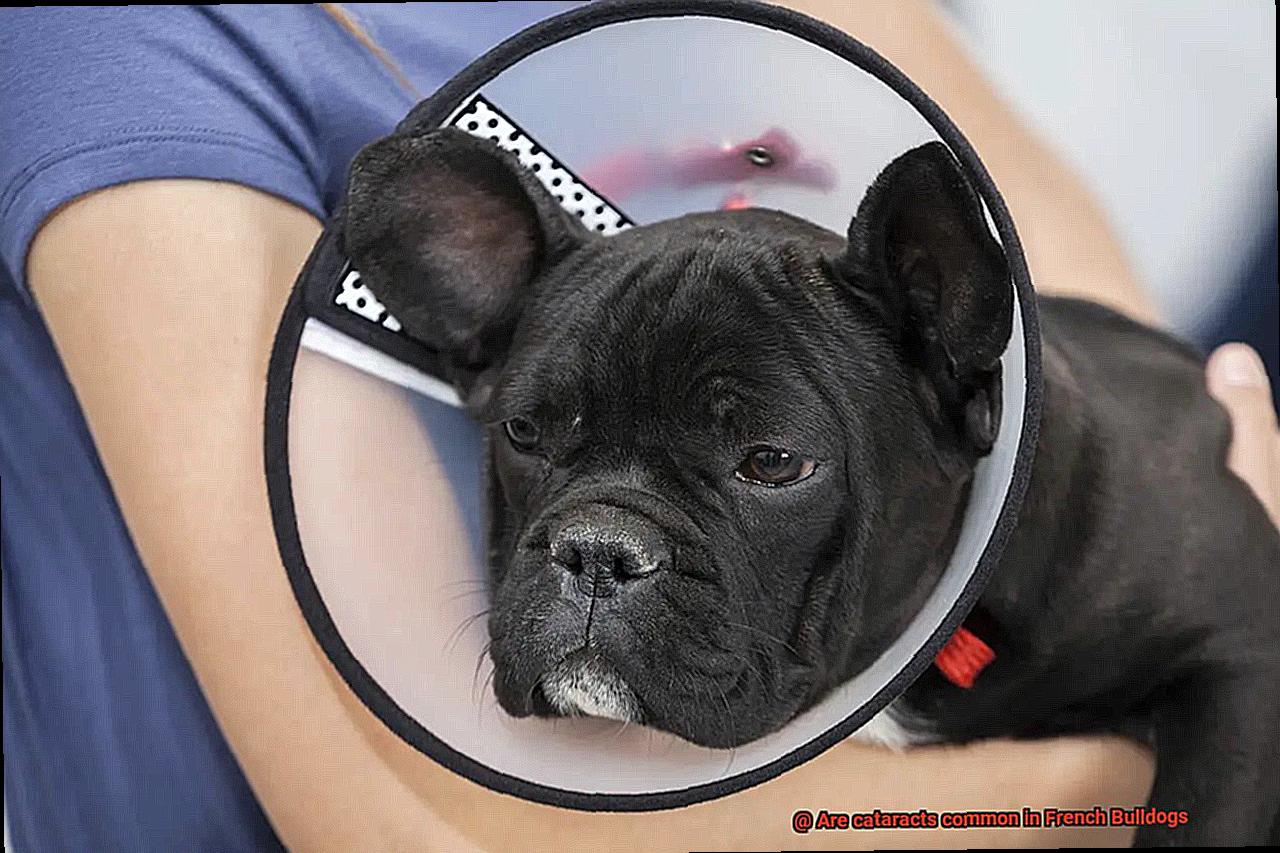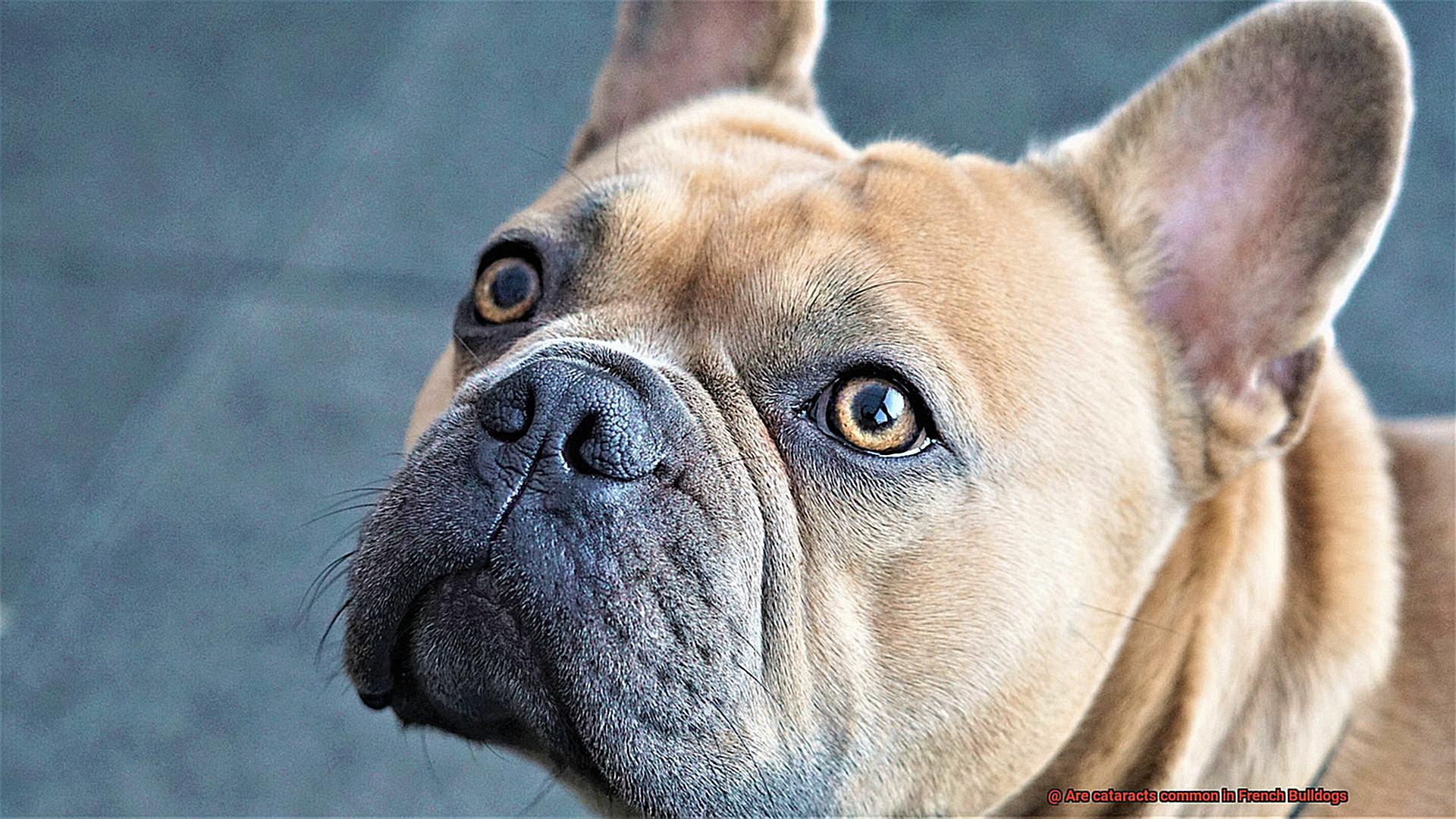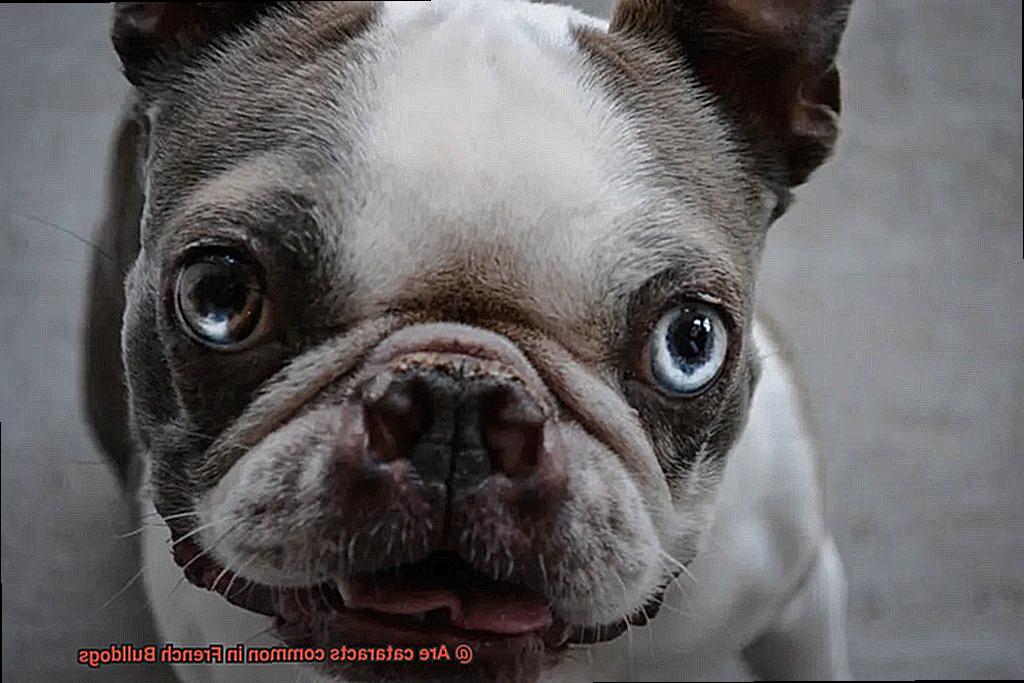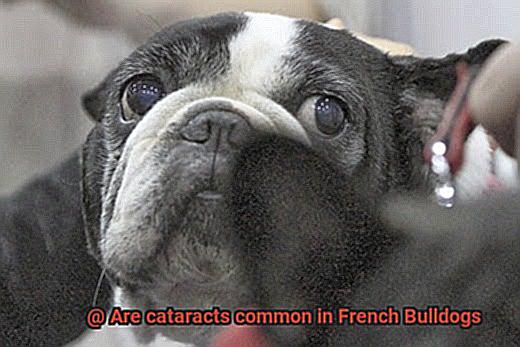Are cataracts common in French Bulldogs?
When it comes to our furry friends, their health is a top priority. If you’re a proud owner of a French Bulldog, you might have heard whispers about cataracts affecting this breed. It’s crucial to understand just how prevalent this condition is, what causes it, and what impact it can have on your pup’s vision. Don’t worry, though – we’ve got all the information you need to ensure your four-legged companion sees the world in all its glory.
Cataracts, typically associated with old age, can actually occur in dogs of any age or breed – including French Bulldogs. This condition clouds the lens of their eyes and can seriously impede their vision, causing discomfort and hindering their quality of life. So let’s dive into the causes behind this common issue, explore its effects, and discover the available treatments and preventative measures that will keep your French Bulldog’s eyes shining brightly.
In this comprehensive blog post, we’ll take an in-depth look at cataracts in French Bulldogs. We’ll uncover what commonly triggers them, discuss how they affect your beloved pup’s daily life, and shed light on potential solutions to safeguard their visual health. After all, nothing matters more than preserving those adorable eyes so your furry friend can experience life to the fullest.
So buckle up for this enlightening journey as we equip you with knowledge to better care for your French Bulldog and help them navigate the world with crystal-clear vision and unyielding confidence.
Are cataracts common in French Bulldogs
Contents
- 1 Are cataracts common in French Bulldogs
- 2 What Causes Cataracts in French Bulldogs?
- 3 Genetic Predisposition to Cataracts in French Bulldogs
- 4 Age of Onset for Cataracts in French Bulldogs
- 5 Signs and Symptoms of Cataracts in French Bulldogs
- 6 Treatment Options for Cataracts in French Bulldogs
- 7 Surgery as a Treatment Option for Cataracts in French Bulldogs
- 8 The Benefits of Early Detection for Cataracts in French Bulldogs
- 9 Prevention Tips for Avoiding Cataracts in French Bulldogs
- 10 Conclusion
While cataracts can affect any dog, French Bulldogs do have a higher predisposition to developing this eye condition. In this article, we’ll explore why cataracts occur in French Bulldogs, how to recognize the symptoms, and what preventive measures can be taken to ensure your furry friend’s eye health.
Understanding Cataracts in French Bulldogs:
Genetic Predisposition:
French Bulldogs are more susceptible to cataracts due to genetic factors. A specific mutation in the HSF4 gene has been identified as a major contributor to cataract development in this breed. It is therefore crucial to be aware of your French Bulldog’s lineage and any history of cataracts in their bloodline.
Age and Other Factors:
While cataracts are commonly observed in older dogs, they can also occur at a young age or even be present from birth in French Bulldogs. Other factors such as trauma, nutritional deficiencies, and certain health conditions can also contribute to the development of cataracts.
Recognizing the Symptoms:
Cloudiness or Opacity:
One of the most noticeable signs of cataracts is cloudiness or opacity in the eyes. This clouding affects vision and can progress over time if left untreated.
Changes in Behavior:
Keep an eye out for changes in behavior, such as clumsiness or bumping into objects. These could indicate that your French Bulldog is experiencing difficulty seeing.
Preventive Measures:
Regular Eye Examinations:
Schedule regular eye examinations with a veterinarian to detect any early signs of cataracts. Early detection can help ensure timely intervention and appropriate treatment.
Maintain a Healthy Diet:
A balanced diet rich in antioxidants and essential nutrients can support your French Bulldog’s overall eye health. Consult with your veterinarian to determine the best diet for your furry friend.
Avoid Trauma to the Eyes:
Prevent eye injuries by keeping your French Bulldog away from hazardous environments and using protective eyewear if necessary.
Stay Proactive:
Be proactive in monitoring your French Bulldog’s eyes for any changes or abnormalities. If you suspect cataracts, seek veterinary attention promptly for an accurate diagnosis and treatment options.
What Causes Cataracts in French Bulldogs?
French Bulldogs are adorable and lovable companions, but just like any other dog breed, they can be susceptible to certain health conditions. One of these conditions is cataracts, which can affect their eyesight. Let’s explore the various factors that can contribute to the development of cataracts in French Bulldogs.
GENETIC FACTORS: The Cute Culprit
French Bulldogs have a genetic predisposition to developing cataracts. This means that certain gene mutations make them more prone to this eye condition. One of the most common genetic mutations associated with cataracts in French Bulldogs is called the HSF4 mutation. This mutation affects the heat shock transcription factor 4 gene and is inherited in an autosomal recessive manner. In simpler terms, it means that both parents must carry the mutation for their offspring to develop cataracts. Another genetic mutation called the CRYAA mutation has also been linked to cataract development in French Bulldogs.
ENVIRONMENTAL FACTORS: Watch Out for Toxins and Trauma
Apart from genetics, certain environmental factors can also contribute to the development of cataracts in French Bulldogs. Exposure to toxins, such as chemicals or pollutants, can increase the risk of cataract formation. It’s important to keep your furry friend away from harmful substances and ensure they live in a clean and safe environment. Trauma to the eye, whether from accidents or rough play, can also lead to cataract development. So, be mindful of their surroundings and provide supervision during energetic play sessions.
AGE-RELATED FACTORS: Growing Older, Cloudier Eyes
Just like humans, French Bulldogs experience age-related changes that can affect their eyes. As they grow older, their risk of developing cataracts increases. These age-related cataracts are often referred to as “senile” cataracts. While the exact cause may not be known, it’s important to monitor your French Bulldog’s eye health as they age and seek veterinary attention if you notice any changes in their vision.
UNDERLYING HEALTH CONDITIONS: The Double Trouble of Diabetes
Certain underlying health conditions can increase the likelihood of cataract formation in French Bulldogs. One such condition is diabetes mellitus. Dogs with diabetes are more prone to developing cataracts, and French Bulldogs are no exception. If your furry friend has been diagnosed with diabetes, it’s crucial to manage their condition carefully and work closely with your veterinarian to prevent complications like cataracts.
PREVENTION IS BETTER THAN A PATCHED EYE:
While we can’t completely eliminate the risk of cataracts in French Bulldogs, there are steps we can take to reduce the likelihood of their development. Regular veterinary check-ups are essential for monitoring your furry friend’s overall health, including their eyes. Additionally, maintaining a healthy diet, providing regular exercise, and avoiding exposure to harmful substances can help support their eye health.
Genetic Predisposition to Cataracts in French Bulldogs
French Bulldogs are known for their distinctive appearance and playful personalities. However, they also have a higher risk of developing cataracts compared to other dog breeds.
In this blog post, we will explore the genetic predisposition to cataracts in French Bulldogs and discuss measures that can be taken to reduce the risk of passing on the condition.
Understanding the Genetic Factors:
Cataracts in French Bulldogs are often inherited and can be traced back to certain genetic factors. The formation of cataracts is influenced by various genes, with mutations in these genes increasing the likelihood of cataract development.
One of the main genes associated with cataract development in French Bulldogs is the HSF4 gene. Mutations in this gene disrupt the normal development and maintenance of the lens, leading to cataract formation. Other genes such as EPHA2, LIM2, and CRYAA have also been identified as potential contributors to cataracts in this breed.
Reducing the Risk through Responsible Breeding:
To reduce the risk of passing on cataracts to future generations, responsible breeding practices are essential. Genetic testing should be performed on breeding dogs to identify any known cataract-associated mutations.
Selecting breeding pairs without these mutations can significantly reduce the likelihood of passing on the condition. By working closely with reputable breeders who prioritize genetic health, you can ensure that your French Bulldog has a lower risk of developing cataracts.
Regular Eye Examinations:

Regular eye examinations by a veterinary ophthalmologist are crucial for early detection and management of cataracts in French Bulldogs. These examinations can help identify any signs of cataract formation at an early stage, allowing for prompt intervention and treatment if necessary.
Age of Onset for Cataracts in French Bulldogs
We all know that these little bundles of joy bring so much happiness to our lives. But did you know that they are prone to developing cataracts? Yep, those cloudy formations in the lens of the eye can affect our furry friends too. In this blog post, we’re going to dig deep into the age of onset for cataracts in French Bulldogs and give you all the information you need to keep your pup’s peepers healthy and bright.
The Timing of Trouble:
You might be wondering, when do cataracts typically start causing trouble for French Bulldogs? Well, it varies from dog to dog, but they usually develop later in life. Picture your Frenchie rocking a pair of sunglasses in their senior years – that’s when cataracts often make their grand entrance. But don’t let your guard down just because your pup is still a spring chicken. Some French Bulldogs can develop cataracts as early as a few years old, while others may not have to deal with them until they’re well into their golden years.
Factors at Play:
Now, you might be thinking, what factors contribute to the age of onset for cataracts in French Bulldogs? Ah, great question. It’s a mix of genetics, overall health, and environmental factors.
You see, cataracts can be genetic in nature, meaning they can be passed down from parent dogs to their offspring. So if your Frenchie’s parents had cataracts, there’s a chance they might too. But hey, it’s not all about genetics. Other things like diet, exercise, and exposure to toxins can also play a role in determining when those pesky cataracts decide to show up.
Keeping an Eye Out:
Alright, now that you know when cataracts can strike, it’s time to talk prevention and early detection, my friends. Regular visits to the vet and annual eye examinations are a must for French Bulldogs. Your veterinarian can catch any signs of cataracts early on and guide you on the best course of action. Remember, early detection is key to preserving your Frenchie’s vision and preventing further complications down the road.
The Severity Spectrum:
Cataracts come in all shapes and sizes, just like our Frenchies. The severity of cataracts can range from mild cloudiness to complete opacity of the lens. If left untreated, cataracts can progress over time, leading to vision impairment or even blindness in severe cases. So don’t wait until your Frenchie’s vision starts resembling a foggy window – seek veterinary care as soon as you notice any changes in their eyes.
Signs and Symptoms of Cataracts in French Bulldogs
If you’re a proud French Bulldog owner, you know just how precious your furry friend’s vision is. Unfortunately, cataracts can be a common eye condition in French Bulldogs, affecting their ability to see clearly. In this article, we’ll discuss the signs and symptoms of cataracts in French Bulldogs, so you can be aware and take prompt action if needed.
Cloudy or Opaque Appearance:
One of the most noticeable signs of cataracts in French Bulldogs is a change in their eye’s appearance. The affected eye may appear cloudy or opaque, similar to a foggy window. This cloudiness is caused by the build-up of proteins in the lens of the eye, which obstructs clear vision.
Change in Eye Color:
Cataracts can also cause a change in the color of your French Bulldog’s eyes. You may notice a whitish or grayish coloration over the lens, indicating the presence of cataracts. This change in color is often more pronounced in lighter-colored French Bulldogs.
Behavioral Changes:
French Bulldogs with cataracts may exhibit certain behavioral changes due to their compromised vision. They may become more hesitant or cautious when moving around, as they struggle to see clearly. You might notice them bumping into objects or having difficulty navigating familiar spaces. Excessive squinting or blinking can also be signs of discomfort or sensitivity to light.
Decline in Vision:
As cataracts progress, your French Bulldog’s ability to see clearly will decline. They may struggle to recognize familiar faces or objects, even at close distances. This can manifest as a lack of response when called or difficulty tracking moving objects. Some dogs may also develop increased nearsightedness or farsightedness as a result of cataracts.
Potential Blindness:

In advanced stages, cataracts can lead to complete blindness in French Bulldogs. If both eyes are affected, your dog may rely heavily on their other senses to compensate for the loss of vision. They might start relying more on their sense of smell or hearing to navigate their surroundings.
Treatment Options for Cataracts in French Bulldogs
If you’ve noticed that your furry companion’s eyes have become cloudy or opaque, they may be suffering from cataracts. Cataracts are a common eye condition in dogs, including our beloved Frenchies. While they cannot be completely cured, there are several treatment options available to manage this condition and improve your pup’s quality of life. In this article, we’ll explore the different treatment options for cataracts in French Bulldogs, so grab a café au lait and let’s dive in.
Surgical Intervention: The Clear Path to Better Vision
When it comes to treating cataracts in French Bulldogs, surgery is often the most effective option. Phacoemulsification, a procedure performed by a veterinary ophthalmologist, involves removing the cloudy lens and replacing it with an artificial one. However, it’s important to consult with your veterinarian to determine if your Frenchie is a good candidate for surgery.
Medications: A Helping Hand for Cataract Management

In some cases, medications can be prescribed to slow down the progression of cataracts and alleviate discomfort or inflammation. While they won’t reverse or cure the condition, they can provide relief for your furry friend.
Nutritional Supplements: A Sight for Sore Eyes
Certain nutritional supplements, such as vitamin C and vitamin E, have been shown to reduce oxidative stress and potentially slow down the progression of cataracts. Consult with your veterinarian to see if adding these supplements to your Frenchie’s diet could be beneficial.
Lifestyle Modifications: A Holistic Approach to Eye Health
Maintaining a well-balanced diet, regular exercise, and a stress-free environment can contribute to overall eye health and potentially slow down the progression of cataracts. Additionally, keeping your Frenchie’s eyes clean and free from debris can help prevent secondary infections or complications.
Regular Eye Examinations: Eyes on the Prize
Regular eye examinations by a veterinary ophthalmologist are crucial for monitoring the progression of cataracts. Early detection and intervention can lead to better treatment outcomes and an improved quality of life for your pup.
Surgery as a Treatment Option for Cataracts in French Bulldogs
When it comes to treating cataracts in French Bulldogs, surgery is often considered the best option for restoring their vision and improving their quality of life. Let’s dive into the surgical procedure, risks involved, and post-operative care that comes with cataract surgery for your furry companion.
The Surgical Procedure:
Cataract surgery in French Bulldogs follows a similar process to that in other dog breeds. Here’s a breakdown of the procedure:
- Pre-operative examination: Before proceeding with surgery, your French Bulldog will undergo a thorough examination to evaluate their overall health and eye condition. This step helps determine if they are a suitable candidate for surgery.
- Anesthesia: The surgery is typically performed under general anesthesia to ensure your dog remains comfortable throughout the procedure.
- Lens removal and replacement: During the surgery, the cloudy lens causing cataracts is carefully removed from your French Bulldog’s eye. It is then replaced with an artificial lens, known as an intraocular lens (IOL), which helps restore clear vision.
Risks of Cataract Surgery:
While cataract surgery has a high success rate, it’s essential to be aware of potential risks and complications. These can include:
- Infection: There is a slight risk of developing an infection after surgery. However, proper post-operative care and following your veterinarian’s instructions can help minimize this risk.
- Inflammation: Inflammation may occur in the eye following surgery, but it can usually be managed with medication prescribed by your veterinarian.
- Retinal detachment: Although rare, there is a small chance of retinal detachment after cataract surgery. Regular follow-up appointments with your veterinary ophthalmologist are crucial to monitor your French Bulldog’s healing progress and detect any potential issues early on.
Post-Operative Care:
After cataract surgery, your French Bulldog will require diligent post-operative care to ensure a smooth recovery. Here are some essential aspects of post-operative care:
- Administering eye drops and medications: Your veterinarian will prescribe specific eye drops or medications to be administered as directed. These medications help prevent infection and reduce inflammation.
- Regular check-ups: Follow-up appointments with your veterinary ophthalmologist are necessary to monitor your dog’s healing progress and address any concerns that may arise.
- Preventing eye rubbing or scratching: It’s crucial to prevent your French Bulldog from rubbing or scratching their eyes during the recovery period. This can be achieved by using an Elizabethan collar or providing constant supervision.
- Managing underlying health conditions: If your French Bulldog has any underlying health conditions contributing to the development of cataracts, such as diabetes or hypothyroidism, it’s vital to manage them effectively to ensure the best possible outcome after surgery.
The Benefits of Early Detection for Cataracts in French Bulldogs
We all know how much we adore our furry friends and want the best for them. That’s why it’s essential to be aware of potential health issues that can affect our beloved pups. One common condition that can impact French Bulldogs is cataracts. But fear not. Early detection can make a world of difference for your pup’s vision and overall well-being. Let’s dive into the benefits of catching cataracts early in your French Bulldog.
- Slow Down the Progression: Early detection allows for timely intervention and treatment, which can help slow down the progression of cataracts. Just like with any health issue, addressing it sooner rather than later gives your pup a better chance at maintaining good vision.
- Identify Underlying Causes: Detecting cataracts early on helps identify any underlying causes or contributing factors. Certain genetic predispositions or health conditions can increase the risk of cataracts, and early detection allows for appropriate management of these factors.
- Proper Guidance and Recommendations: When your vet detects cataracts early, they can provide you with proper guidance and recommendations for managing the condition. This might include dietary adjustments, lifestyle modifications, or the use of medications or supplements to support eye health.
- Monitoring and Informed Decisions: Early detection enables owners to monitor the progression of cataracts and make informed decisions about potential surgical interventions if necessary. Surgery may be recommended to remove cataracts and restore vision in affected French Bulldogs.
- Improved Quality of Life: Timely treatment of cataracts can improve your pup’s quality of life and prevent complications that may arise from advanced stages of the condition. By addressing cataracts early on, you reduce the risk of secondary eye infections, inflammation, and discomfort associated with untreated cataracts.
- Preventing Other Eye Conditions: Early detection allows owners to take proactive measures to prevent or manage other eye conditions that may arise as a result of cataracts. Regular monitoring can help detect and treat conditions like glaucoma or retinal detachment that may accompany or follow cataract development.
- Emotional and Financial Preparation: Early detection of cataracts in French Bulldogs helps owners prepare emotionally and financially for the long-term management of the condition. Understanding the potential impact on your dog’s vision, making lifestyle adjustments, and preparing for potential costs associated with treatment or ongoing care can all be done more effectively when caught early.
Prevention Tips for Avoiding Cataracts in French Bulldogs
French Bulldogs are adorable and beloved pets, but did you know that they can be prone to developing cataracts? Cataracts are a common eye condition that can cause cloudiness or opacity in the lens of the eye, leading to vision impairment or even blindness if left untreated. While cataracts can occur in any breed, certain preventive measures can help reduce the risk of cataracts in French Bulldogs. Here are some tips to keep your furry friend’s eyes healthy and cataract-free:
Maintain a Healthy Diet
A well-balanced diet rich in essential nutrients, vitamins, and antioxidants is crucial for supporting overall eye health. Provide your French Bulldog with high-quality dog food that is specifically formulated to promote eye health.
Regular Exercise
Regular exercise not only keeps your French Bulldog fit and healthy but also promotes good blood circulation, which is beneficial for their eyes. Take them for daily walks or engage them in fun activities that encourage physical movement.
Protect from Harmful UV Rays
Just like humans, dogs are susceptible to the damaging effects of UV rays. Protect your French Bulldog’s eyes by using dog-specific sunglasses or providing shade when outside on sunny days.
Regular Veterinary Check-ups
Regular visits to the vet are important for early detection and prevention of cataracts. Your vet can conduct thorough eye examinations and recommend preventive measures based on their findings.
Keep Eyes Clean
Keeping your French Bulldog’s eyes clean and free from irritants or debris is essential. Regularly wipe their eyes with a damp cloth or use a veterinarian-recommended eye cleanser to prevent infections and reduce the risk of cataracts.
Avoid Environmental Factors
Minimize exposure to smoke, dust, chemicals, and other potentially harmful substances that can contribute to the development of cataracts. Create a stress-free environment for your French Bulldog by avoiding loud noises and excessive heat.
Remember, genetics also play a role in the development of cataracts, so it’s important to choose a reputable breeder when getting a French Bulldog puppy. Responsible breeders perform health screenings on their dogs to minimize the risk of passing on genetic conditions such as cataracts.
Conclusion
In conclusion, cataracts are indeed common in French Bulldogs. These adorable and lovable companions are unfortunately prone to this eye condition. It is essential for French Bulldog owners to be aware of the potential risks and take proactive measures to protect their furry friends’ vision.
Cataracts can significantly impair a French Bulldog’s eyesight, leading to blurred vision or even complete blindness. This can greatly impact their quality of life and overall well-being. Therefore, regular eye examinations by a qualified veterinarian are crucial in detecting cataracts early on.
Genetics play a significant role in the development of cataracts in French Bulldogs. Breeding from dogs with a history of cataracts increases the likelihood of passing on this condition to future generations. Responsible breeders should prioritize health screenings and avoid breeding dogs with known cataract issues.
While there is no foolproof way to prevent cataracts entirely, certain steps can help minimize the risk. Providing a healthy diet rich in antioxidants, regular exercise, and protecting their eyes from injury or excessive UV exposure are all vital preventive measures.
If your French Bulldog is diagnosed with cataracts, don’t despair. Advances in veterinary medicine have made treatment options available that can improve your dog’s vision and quality of life. Surgical procedures such as phacoemulsification or intraocular lens implantation have shown promising results in restoring sight for affected dogs.
Remember, early detection and intervention are key when it comes to managing cataracts in French Bulldogs. By staying vigilant and taking proactive steps, you can ensure that your furry companion enjoys a happy and healthy life despite this common eye condition.
So, if you’re considering adding a French Bulldog to your family, it’s important to understand the prevalence of cataracts within this breed.




